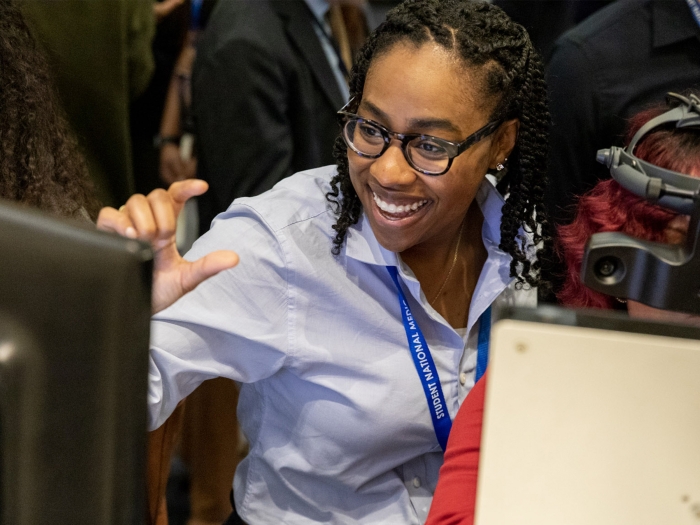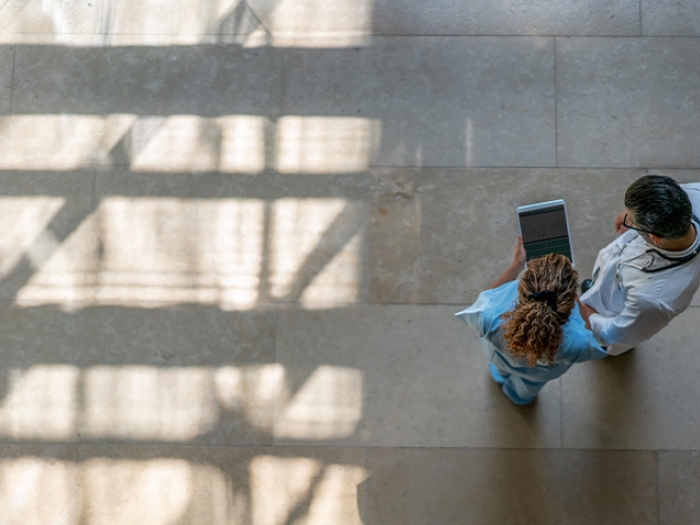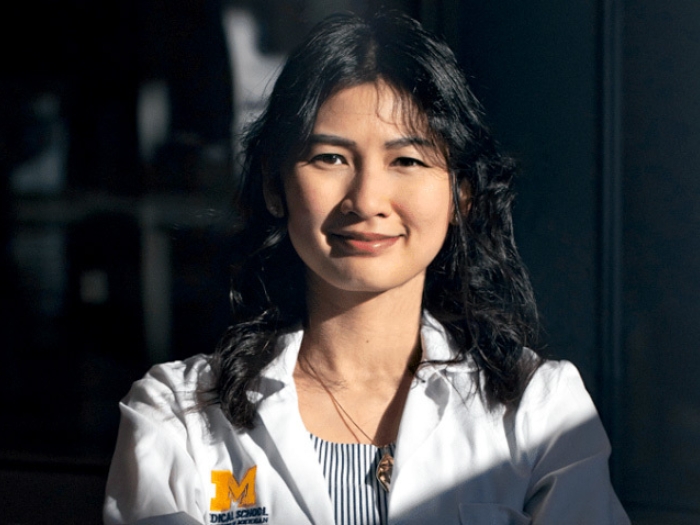How do you survive your first year of medical school? Having the right strategies and mindset can help. Here, second-year students offer tips for those just starting out.
1:00 PM
Author |

Medical school, as many students know by now, isn't a sprint.
But the journey of a first-year student can move at a breakneck pace, from complex lectures and hands-on coursework to small-group discussions and hitting the books. Set those challenges amid a community of accomplished peers, and the finish line might seem distant, if not impossible.
MORE FROM THE LAB: Subscribe to our weekly newsletter
Students who have completed their first year can attest the task isn't easy, but it is worthwhile. They also have a message for newcomers: You can do this.
Beyond hard work, success requires adaptability and an open mind.
"There's a learning curve of how to manage your life and your goals," says Brittany Ervin, now an M2 at the University of Michigan Medical School. "A preconceived notion of attack doesn't work. Getting comfortable with constant change has been one of my biggest strategies."
In recent interviews, she and several second-year classmates affirmed that notion.
Here, in their own words, is some insight for those entering or considering a medical education:
An intense academic workload awaits
It can be overwhelming — the "drinking from a fire hydrant" analogy is appropriate. Be mindful about the material: You won't necessarily remember every detail over the next couple months. Don't just mindlessly try to cram all this information into your brain just to regurgitate it.
What's important is that you take at least one thing away from each lecture and some big things from each sequence — foundational things to build on throughout your career.
— Samantha Chao, 23
Medical school is not so much about whether you can learn the facts. You must, of course, but being a good physician is about cultivating a clinical acumen and a way of problem-solving. Michigan has changed its curriculum to "vignette"-style testing. You have a scenario and think through it: How do you process large volumes of information and pick out what's important?
There's a Doctoring course where we learn physical exam maneuvers and the communication style of being a physician. There are 10 students for every two doctors teaching it in four-hour sessions. Don't waste the opportunity to learn, personally and professionally.
— Brittany Ervin, 27

Everyone learns and studies differently
As an undergrad, you have a class for an entire semester. Here, our sequences change every few weeks. Neurology, for example, was more about understanding how these pathways work to be able to problem-solve for tests and quizzes. Others might require rote memorization of drugs and side effects.
SEE ALSO: What the Michigan Med School Admissions Team Looks for On Applications
At Michigan, we can stream a lot of our lectures, which allows you to tailor the day. When we did have required clinical encounters, I would always look forward to working with standardized patients or being in a hospital setting, as a reminder of what we were studying for. We have weekend quizzes that open up on Friday and close Sunday. For me, the weekend would be putting everything together, memorizing it and making sure I understood all we learned.
— Nathan Vengalil, 22
Until med school, I hated flashcards with a passion. But they were really effective in some sequences. For anatomy, I learned by drawing — and I am not good at drawing. Michigan gives each of us a subscription to an awesome website called Osmosis, which is a collaborative website for medical students.
The school also has a really great support structure through the M-Home learning community. We're all put into a "house" at the beginning of the year. Each comes with a house director plus your coach, a house counselor and Doctoring faculty. Even if there are no issues going on, I recommend taking time at the beginning of the year to meet with these people. They're here to help you.
— Gracia Vargas, 24
Your classmates are colleagues, not competitors
Coming into med school, I was pretty self-conscious about the fact I didn't major in biology or something like that. I gravitated toward making friendships with people from a similar background — the nontraditional students, those who took a few years or had studied anthropology or philosophy. It was helpful to find others with similar experience.
I was doing well, but I had the sense I had to work a lot harder than my classmates to get to the same place. Fortunately, the culture here is super collaborative. People help each other out so they can do their best. Once you're here, it's a family.
— Gracia Vargas
I don't think you can make it through med school without a sense of belonging to a more personal community. It's absolutely necessary. Still, I've struggled with how many close friends to make. Everyone here is so nice and intelligent and has an incredible story.
In any case, I think it's always been kind of a golden rule here: Just be nice to other people. That's something Michigan really cares about in the kind of students they recruit.
— Samantha Chao

Make time for mental health breaks and extracurriculars
Because you don't have as much free time to go out and make plans, you have to find opportunities to build in social time. For me, that means participating in different organizations. This allows me to get through my days and helps me prioritize my studying.
I'm part of Biorhythms, a dance group that's almost entirely med students. We perform twice a year. I sing with the medical school a cappella group, the Auscultations. I'm the president of OutMD, our LGBT group for medical students. And I'm a curriculum representative for our Doctoring course.
— Michael Lourie, 25
SEE ALSO: 'A Seat at the Table': Why U-M's Medical School Wants More Students with Disabilities
I've always enjoyed going to the gym, so it was important to me I didn't lose that aspect while in medical school. Working out and losing weight and being healthy is what got me interested in the field of medicine.
Even with that minor commitment, you are always going to think you're behind. But it's important to take a step back and take a moment for yourself. After my gym time, I immediately notice that I'm much more able to concentrate and focus than I had been previously.
— Nathan Vengalil
Your career path isn't yet set in stone
I like the advice I got from people about having an open mind and not approaching certain specialties with any preconceived notions or expectations. There are so many stories of clinical students who wanted to be one thing and then decided to follow the complete opposite path.
We're starting our tracks in early December. I'm super excited to see every rotation. I don't think I'm drawn to any specific one yet — and I'm excited to see what I can get from each specialty.
— Samantha Chao
If something piques your interest, run with it. Talk to your lecturer; most of them are physicians and clinicians. Ask if you can come hang out in their clinic or if they have a colleague who can help you explore your interest. Just explore and have fun. Allow yourself time to develop and grow. Your definition of success will change many times.
As far as choosing a specialty goes, stay open — even after your first year. We're doing clerkships in our second year, so that's a chance to use all of that gathered information. Then, in your third year, you can take what you've learned, re-evaluate what you liked and seek out even more opportunity to build on what your passions might be.
— Brittany Ervin
Photos by Leisa Thompson

Explore a variety of healthcare news & stories by visiting the Health Lab home page for more articles.

Department of Communication at Michigan Medicine
Want top health & research news weekly? Sign up for Health Lab’s newsletters today!





